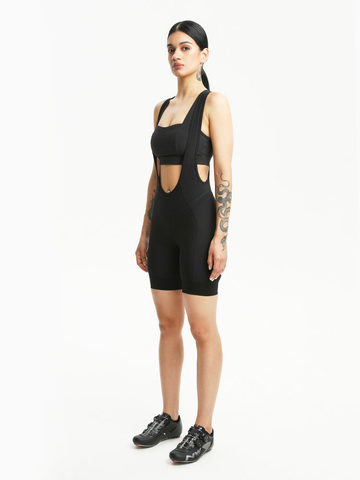
Cycling bibs are essential for every cyclist, and it also becomes a problem how women choose their cycling bibs.
Looking for a more comfortable way to ride? Check out cycling bibs. There’s no doubt cycling shorts are great for some people, but thanks to using suspender-style straps rather than a tight waistband, cycling bibs put less pressure on your abdomen when you're in a crouched position all day. They still offer all the benefits of bike shorts, including a comfortable chamois and moisture-wicking properties, but they also offer additional benefits, like storage pockets and better skin coverage that can help reduce your risk of sunburn.
When you’re trying on bibs, make sure you like the shoulder straps and their placement on your body. While a lot of engineering has gone into designing comfortable shoulder straps for all-day wear, some shoulder straps are too tight or constricting for riders. Look for wider straps that aren’t too thick and have some breathability.
The chamois in a bib is just like the chamois in a cycling short. It’s designed to protect riders' more sensitive parts with a little padding. Modern chamois are made of multiple layers of antimicrobial synthetic materials designed to reduce friction, breathe, and keep sweat, salt, and bacterial growth at bay. This helps reduce saddle sores and other problems that occur when spending hours crouched over the bars. The best chamois are supportive but don’t feel like you’re wearing a diaper between your legs. Most good chamois feature anatomically shaped patterns and channeled areas to ensure you’re not thinking about them while you’re riding.
Cycling bibs designed for women often have some features that you won't find on men’s bibs. These include straps placed wider apart to accommodate for greater amounts of chest tissue, wider hips, and different chamois placement. Many are also designed to make it easier to go to the bathroom without fully disrobing.
Today, many companies are offering expanded size ranges, increasing inclusivity and making it easier for people with different body types to find bibs that suit them. Generally speaking, “pro” fits are designed for riders who are skinnier, while “club” or “touring” sizes fit those with larger legs and/or a larger abdomen.
The main difference between cycling shorts and bibs are obviously the straps and body panels. Where cycling shorts have a waistband that falls below the belly button, the panels on the front and back of cycling bibs cover up your lower back and most of your stomach.
Just like shorts, cycling bibs are made of spandex, lycra, and other highly elastic materials that sit tight against the skin. Their tight fit helps increase aerodynamics while riding and also offers some compression, which can help ensure a smoother ride and means your bib is less likely to move around as you bike.











































































